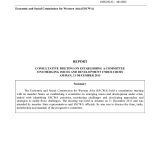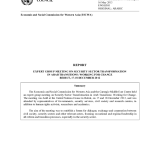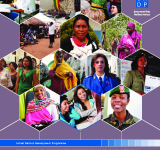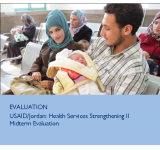capacity-building
نظّمت اللجنة الاقتصادية والاجتماعية لغربي آسيا (الإسكوا) ومركز كارنيغي للشرق الأوسط اجتماع خبراء حول تحديات إصلاح قطاع الأمن في الدول العربية في مرحلة التحوّل السياسي والمجتمعي، يومَي 71 و 71 كانون
تهدف هذه الدراسة إلى تقديم عرض أولي للخدمات المقدمة للناجيات من العنف ضد المرأة في البلدان الأعضاء في الإسكوا، وإلى استكشاف طبيعة نظام الإحالة الموجود في هذه الدول لحماية الناجيات من العنف وتقديم
كتبت هذه الدراسة كجزء من المرحلة الأولى من مبادرة برنامج الأمم المتحدة الإنمائي العالمية عبر الممارسة وعبر المواضيعية بشأن المساواة بين الجنسين في الإدارة العامة، والذي أطلق في عام 211. هذا التقرير
In 2006;; the Sultanate of Oman undertook a project that aimed to support the implementation of the country’s vision towards conservation of biological diversity in the Sultanate of Oman. This report serves as an “evaluation and assessment of capacity building in the field of traditional knowledge related to biodiversity.” The report aims to describe the state of traditional knowledge on biodiversity in Oman;; assess capacity-building requirements in relation to traditional knowledge;; and provide a set of recommendations with a strategy for the protection and maintenance of traditional knowledge on biodiversity conservation. Various topics related to biodiversity are covered;; including irrigation;; tree cultivation;; crop improvement;; livestock management;; and soil and water conservation. The methodology used depends on three sources of information;; including a review of secondary data;; in-depth interviews;; and a participatory workshop.
The report presents the findings;; conclusions and recommendations of a midterm evaluation of Health Systems Strengthening (HSS) II;; a five year (2009-2014);; $73 million USAID-funded project. The strategy of the HSS II is to institutionalize strengthened health systems in support of reduced fertility rates and improved women's health. It works with the public health sector;; namely the Ministry of Health;; the Royal Medical Service and the Jordan University Hospital. The report finds that the project has met 13 of its 23 targets for year 3 and is on track to meet all its objectives by the end of the project. Expected results are public sector initiatives in safe motherhood and reproductive health. The HSS II project;; with its close ties with the Ministry of Health for its responsiveness to health needs and integrated approach to health delivery;; has strengthened critical health systems through its support to health management information system;; renovations;; accreditation;; referrals and capacity-building. The report recommends the USAID to negotiate the removal of a requirement that midwives be supervised intrauterine device insertion;; advocate for innovative incentive schemes and varying salary grades that reward midwives and doctors providing FP services and revise project indicators to reflect health outcomes and impact. Further recommendations include continuing support of a broad-scale mass media behavior change and communication campaign and programs that build on gains in maternal and neonatal health.




